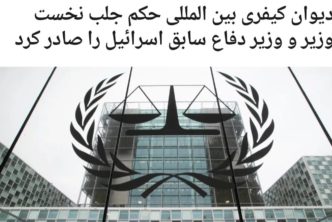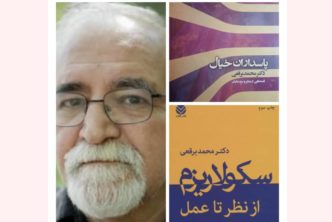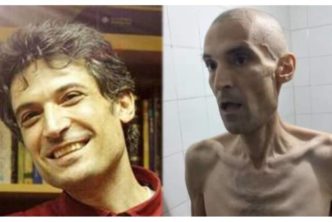by: Emadeddin Baghi
after deleting a few words,it was published in the Sazandegi Newspaper,No 269, Tuesday, January 18, 2019 p. 3
www.emadbaghi.com
June 26 is the International Day for the Prohibition of Torture and Cruel Punishments and for supporting the victims of torture and such punishments. Many reports and papers are published on this issue around the world, but unfortunately, this occasion is not usually dealt with in Iran. Naturally, when such opportunities are not used for enlightenment and culture building, these problems persist.The letter of the labor activist, Esmaeil Bakhshi, arrested in the Union protests of the laborers of Haft Tappeh Sugarcane Agro Industrial Company, about mistreatment at the detention center of Ministry of Intelligence, caused the Judiciary spokesman to got involved in the issue from a supporting position and state that the Prosecutor shall get involved in the issue in case Esmaeil Bakhshi litigate. The fact that judicial authorities and government officials are sensitive and defend the rights of the claimant is a worthwhile event, but it also raises the question that many claims have already been made before, but such a reaction has not been expressed and is unprecedented. Why? This is a matter which requires careful attention and I think it is due to the conflicts within the power. Although such a coming to surface, under any motive and reason, is a blessed one and it shows what catastrophes may occur if there is an unclaimed state. But undoubtedly, it was more valuable if such an involvement had rather been made on the basis of a reformative and truthful approach and the Prosecutor had gotten involved and interfered apriori, whenever and wherever such a catastrophe emerged. Earlier, Abdullah Momeni, Hamza Karami and some other convicts of the events of the year 2009 had released such reports, but not only they were heard, but they faced new lawsuits and files. Many people did not publicize what had happened to them, rather, they filed a formal complaint, but were never heard. I enumerated the ill-treatments I had experienced during the detention to the Prosecutor, which he subsequently advised to sue, but so far no news has been heard of any such hearing. In the cases of Zahra Kazemi, Sattar Beheshti and also Dr. Kavous Seyedemami, also, the claim of such ill-treatments were raised, and some MPs got involved in the issue and verified the reports of the ill-treatments, but why the perpetrators have never been identified and punished and why no effective preventive action was ever taken? It has repeatedly been argued that solitary imprisonment itself is a torture (even if there is no battery and assault). In fact, it is worse than battery and assault, so much so that the late Ayatollah Shahroudi, former head of the judiciary, issued the order of the ban of solitary imprisonment, but the order was not executed. In the past, officially, it raised no opposition and it was justified. This issue was also raised at the beginning of the revolution, and in the Constitutional Assembly Expert. In the 30th meeting for the final evaluation of the Constitution presided by Ayatollah Montazeri on September 25, 1979, when reviewing the approval of the principle of prohibition of torture in the Constitution (principle 38), Ayatollah Meshkini said: “Torture, in any way to get a confession or information, is prohibited and we believe that this is a non-Islamic and inhuman thing; of course, we vote for this prohibition, but some issues should be taken into consideration. For instance, few people of outstanding character are kidnapped and there are two or three individuals whom we know have the information of the kidnappers, and the information on kidnapping may be revealed, if this two or three individuals are slapped in the face. Is torture prohibited even in such cases?”
Ayatollah Beheshti, the vice chairman of the Assembly, replied: ” Obtaining information has its own ways and it is possible to obtain such information without it [torture]. Ayatollah Meshkini argued that “if he is exposed to some tortures like that, he may confess. In the event of murder of Professor Motahari, for example, there may be a person who knows who was the assassin, but certainly he would deny the truth if he is merely questioned.
Ayatollah Montazeri, the speaker of the Assembly, disagrees and says: “The harm is worse than its benefits.”»
Ayatollah Meshkini continues: ” Given that such an issue existed in the past, does the rule of ” Avoiding the more corrupted by the less corrupted” holds true or not? Ayatollah Beheshti again replied: “Mr. Meshkini, please pay attention that the concern is over opening the way of some [evil] thing, and, that is the question. As soon as this practice [torture] is opened and they [the concerned authorities] wanted to slap in the face of some one who is accused of the biggest crimes, be sure this will certainly lead to cauterizing all the people. So, this way [torture]should be closed; that is, even if 10 famous people are kidnapped, and if torture is not practiced; surely, the society shall remain healthier. Then Ayatollah Montazeri also gave the most important response to Ayatollah Meshkini: ” It is better that a guilty be at large, than an innocent be caught.” (minutes of the detailed negotiations of the meetings of the final review of the Constitution, p. 777 and 778).
But the reason why a day is called the international day of torture is the fact that the issue of torture is a global one. Amnesty International announced in an official report in 2014 that in spite of the fact that 155 countries of the world have signed an agreement in order to prevent torture, violence and torture still persist in the prisons of 141 countries of the world. Therefore, if civil society organizations and human rights activists ignore this issue for a moment, then in the most democratic countries there is a risk of it happening. What is important is systematic torture. It may be an error committed by an officer in charge and he may be punished for it, but systematic torture is a torture which has been legalized or the law opens the way for perpetrating it under any title; or the judicial or security bodies apply it as a practice and that is exactly the thing which turned into a crisis in Guantanamo. In fact, it was the American press who disclosed this scandal due to their authority and independence and without the least sense of danger from the power. The Senate intelligence committee released a six-thousand-page report on CIA torture between September 11, 2001 and the end of the Bush presidency, which lasted five years.
In the early years of the Islamic revolution that the issue of bombings and terrors was the problem, this issue was always raised that if a judge ensure that the accused has some important information that can prevent the loss of many lives, but refuses to give information, are the concerned authorities permitted to Tazir [punish]him to obtain information? As it was seen before in the detailed negotiations of the Experts Assembly, religious references have given different answers to this question. Some of religious references permitted it, some did not and some others prescribed it along with many constraints and conditions. After 9/11, exactly the same issues were raised in America.
Even in Canada, the government has instructed its intelligence service that it can use the information it has obtained through torture in case public security is compromised. BBC reported that the order was issued by the Government of Canada in 2010. (BBC, Canada Weekly, No. 229).
Solution: Beyond the cultural and long-term solutions, there are two immediate ways:
1. Article 38 of the Constitution states: “Any torture to obtain confession or to obtain information is prohibited. It is not permissible to force someone to testify, confess, or swear an oath. Such a testimony, confession, or oath is worthless.Anyone who deviates from this article shall be sentenced in accordance with law. The phrase ” any kind of torture” implies that even white torture and solitary confinement, prolonged detention and any action that is not of hitting type, but causes mental or physical abuse of the defendant or the prisoner is a crime and the perpetrator should be punished according to the constitution.
2- One solution, which despite the clear text of the law, different entities violate it is the presence of the attorney at all stages. In the opening speeches of the “Scientific and Applied Conference on Attorney, Defense, Initial Investigations” at Shahid Beheshti University in 2006, I said: “It’s true that some people under torture and pressure make false confessions to be saved, and it is also true that some criminals by claiming torture and by denial of their confession make the case difficult. There has been reports and observations in the prisons for both of the cases. What really should be done in the face of such problem? Not practicing torture is the answer to the problem, nor abandonment of the accused and the case to his desires and wishes.
Today, scientific methods and techniques are used to this end. In many developed countries, there are also murders and other crimes, but why and how do they find the greatest discoveries without long detention,torture and pressure? Because they use scientific methods. In addition, the very presence of a lawyer brings confidence to the process of detecting a crime.Another solution is to entrust the social supervisions to civil society and the press. Civil institutions can stop the violation of the rights of the citizens by the powerful and disclose them, on the one hand, and also prevent the criminals and offenders from taking advantage of distrust to the proceedings, on the other hand (proceedings of Lawyer, Defense and Initial Investigation Conference). Simultaneous with the conference, there came an editorial in Shargh Newspaper entitled the Duel of the Elephant and the Cup[ the Unequal War of the Elephant and the Cup ]: the Rights of the Defendant in the course of Interrogation Period. It was on the inequality of the circumstances of the accused, the interrogator and the judge (Shargh Newspaper Editorial, May 29, 2006). The bitter fact is that the right to a lawyer has always been obstructed. The note under Article 128 of the previous law ignored the “right to a lawyer”, and the law of procedure approved in 1913 also states in Article 48: “Upon commencement of the examination, the accused may apply for the presence of a lawyer. The lawyer should meet with the under-examination person with due regard for the confidentiality of the investigations and negotiations. Note: In case a person is under examination due to the accusation of committing one of the organized crimes or crimes against the internal and external security of the country, theft, narcotics and psychotropic substances or crimes subjects of provisions of paragraphs (a), (b) and (c) of article 302 of this law, it is not possible for the accused to meet with a lawyer for a week after the commencement of the examination. But despite the approval of the Parliament and the Guardian Council, a note was suddenly added to it under the pressure of the enforcement officials that” “in crimes against internal or external security, as well as organized crimes, which are punishable under article 302 of this law, at the preliminary stage of the investigations, the parties to the lawsuit should choose their lawyer or lawyers from among the official lawyers of the judiciary approved by the head of the judiciary.
The names of these lawyers are announced by the head of the judiciary»
In fact, with this note, the right to a lawyer has been violated, and individuals should choose the lawyer imposed by the judiciary and the officials, thus opening the way to repeating the disasters of the past. After the events of the January 2018 and following several deaths in prisons, some parliamentarians were scheduled to bring a bill to the parliament to reinstate the note under article 48 to the same former legislation approved by the Guardian Council and accordingly amend this anti-legal note, but it is about several months that they [the MPs] have failed to do such an important and vital issue.
the_International_Day_for_the_Prohibition_of_Torture#
Torture#
کانال گفتارهای باقی
https://t.me/emadbaghi
اینستاگرام emadeddinbaghi
وبسایت www.emadbaghi.com
فیس بوک Emadbaqi@




